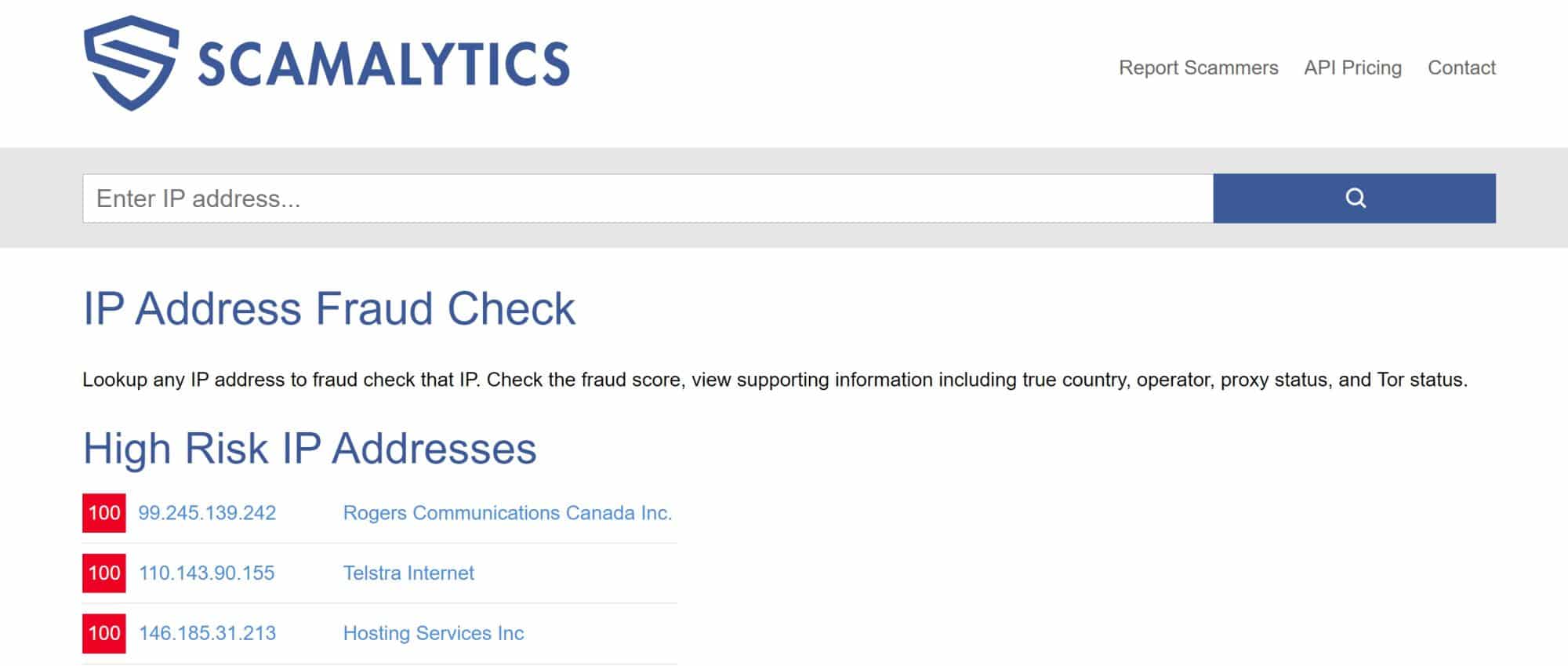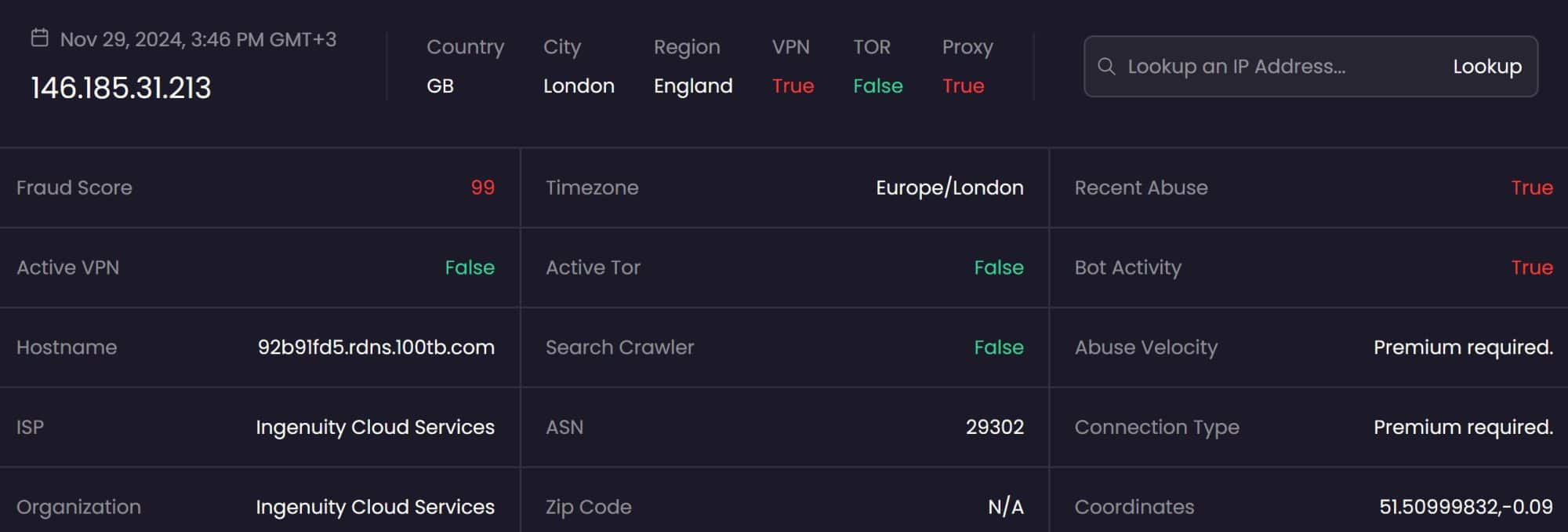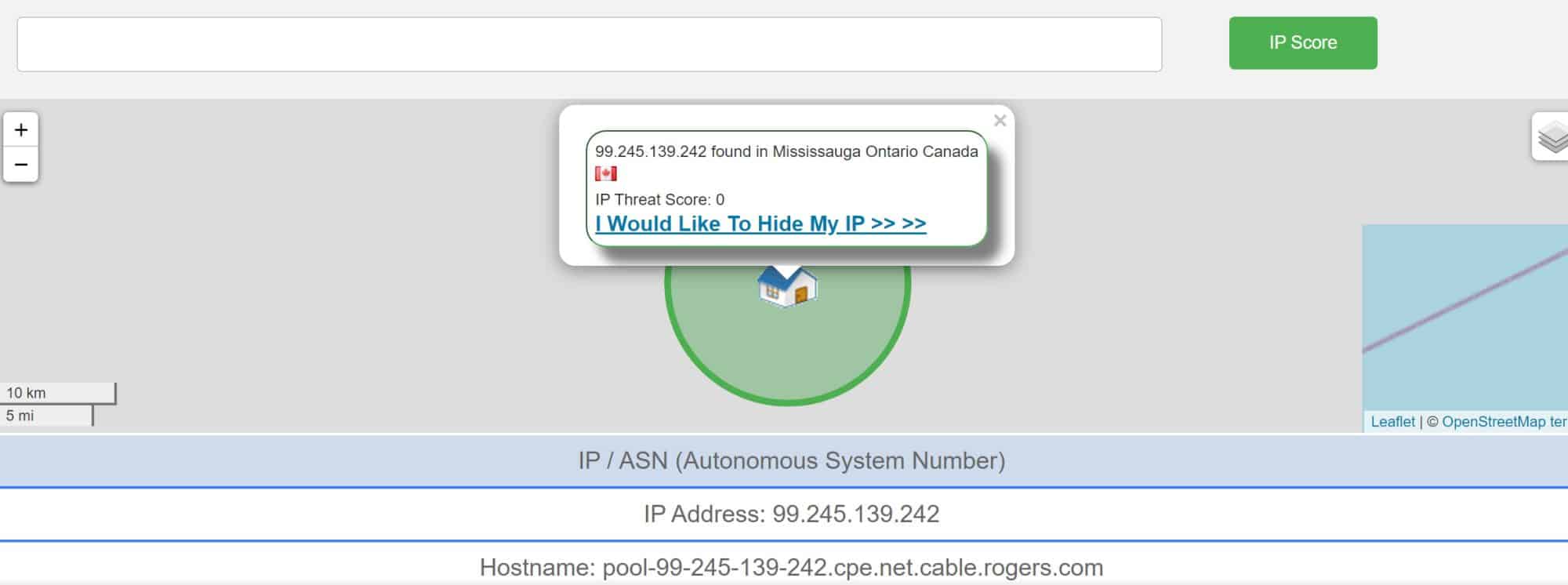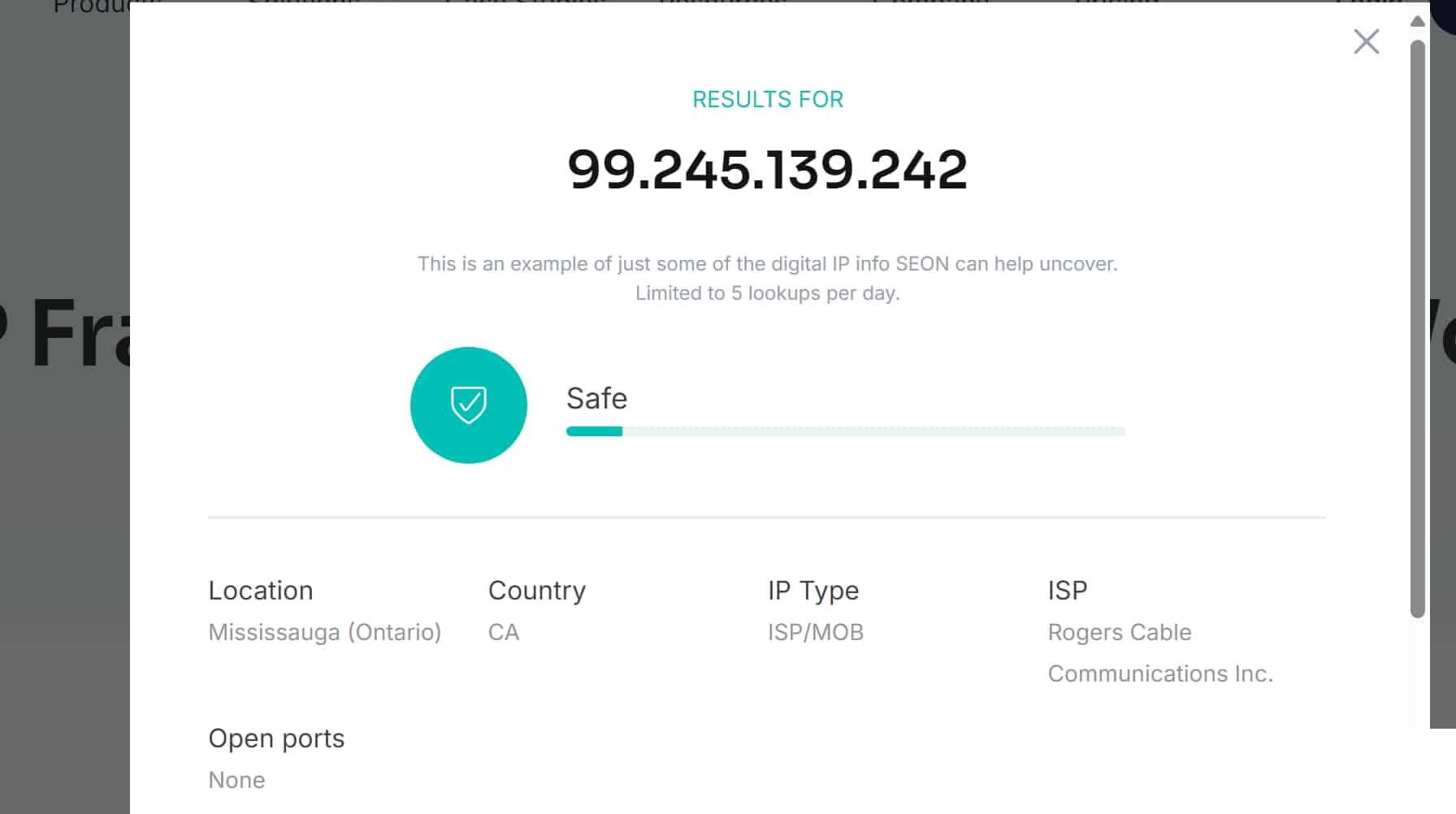We have some bad news for you: fraudsters will never give up.
That’s why having a solid fraud detection system is key, especially for spotting risky IPs before they cause damage.
IP fraud scoring tools assign risk scores based on proxy use, bot behavior, and other red flags.
In this guide, we’ll show you how to check an IP’s risk score and compare 5 powerful tools to help you block bad traffic and protect your brand.
What’s an IP fraud score?
An IP fraud score provides data about the quality and reliability of an IP address. It helps you identify IP risk factors and assign scores. Scores can range from 0 to 100, with a high score indicating potentially dangerous IP addresses. That’s why, for businesses, these scores are important in minimizing the risk of fraudulent behavior by calculating IP risks proactively.
Let’s say you find a suspicious IP address connecting to your system. What should you do next? You can reduce unauthorized access if an IP address has a high fraud score. Depending on the fraud IP score, you might deny, allow, or restrict access. However, you should avoid blacklisting risky IP addresses directly because IPs are often dynamic and shared by multiple users. You wouldn’t want to block potential customers. Before adding an IP address to the blacklist, check its use against speed thresholds or applicable rules.
In short, to stay ahead of malicious activities and maintain a secure system, regularly check IP fraud scores.
How IP quality scores are calculated
So, how does a tool decide if an IP address is risky? It’s not just one thing. Think of it like a detective looking for clues. In a split second, the tool gathers several key pieces of information to build a complete profile of the visitor. Here are the most important clues it looks for:
Proxy and VPN detection
Ever wonder how someone can pretend to be in your city when they’re really across the world? They often use a Proxy or a VPN. These tools act like a digital disguise for their IP address. While many people use VPNs for privacy, it’s a red flag when someone uses one to buy something on a website. The scoring tool instantly checks if the visitor is using one of these disguises and flags it as a potential risk.
IP geolocation analysis
If someone tries to buy a product with a credit card from New York, but their IP address is in Nigeria, that’s a huge warning sign. A fraud score tool instantly looks for these kinds of mismatches. When a visitor’s location is thousands of miles away from their payment or shipping details, the risk score goes up.
Bot and automated behavior
Bots don’t act like people. They’re lightning-fast and do things a real person never could. Imagine someone filling out a long form in under a second; that’s a bot. The scoring tool watches for this superhuman activity, like trying hundreds of passwords at once or copying all of your website’s prices.
Blacklist status and IP reputation
IP addresses earn a reputation over time. If an IP has been caught sending spam, hosting viruses, or attacking other websites, it gets put on a “blacklist.” The scoring tool checks these global blacklists instantly. If the visitor’s IP address shows up on one, it’s considered very untrustworthy, and its fraud score will be high.
What Do the Numbers Mean?
Okay, so the tool gives you a score from 0 to 100. But what do you actually do with that number? Think of it like a traffic light for your website.
-
0 – 50 (Low Risk): This is your typical, everyday user. They look like a real person from a normal home internet connection. For these visitors, you do nothing. Let them browse, shop, and sign up without any interruptions.
-
51 – 75 (Medium Risk): This visitor is a little suspicious. Maybe they’re using a VPN, or their location seems a bit off. You don’t want to block them completely, but it’s smart to be cautious. For this group, you might ask them to solve a CAPTCHA (“I’m not a robot”) or require two-factor authentication (2FA) before they can log in or make a purchase.
-
76 – 100 (High Risk): Stop! This visitor is showing all the signs of being a bot or a fraudster. Their IP might be on a blacklist, or they could be using a known anonymous proxy. For these high-risk scores, the best action is to block them from accessing your site or completing a transaction entirely.
The Limitations of IP Scoring
The biggest issue is the “shared IP problem.” Think about the Wi-Fi at a coffee shop, a university, or even your mobile phone’s 4G/5G connection. Thousands of different people can use the same IP address in a single day. If one person does something bad and that IP gets a high-risk score, should you block everyone else who uses it? Probably not, you’d be blocking legitimate customers.
Because of this, you can’t rely on an IP score alone. It’s just one piece of the puzzle. The smartest approach is to use IP scoring as part of a larger security strategy that might include other checks, like device fingerprinting or transaction monitoring.
Top 5 IP fraud scoring tools
IP2Location

IP2Location is a powerful geolocation tool designed to pinpoint the geographical locations of IP addresses. With its advanced technology, this innovative tool can determine the geographical location of any IP address without the user’s explicit consent. Besides, for a more detailed look at IP2Location’s capabilities, check out our detailed post on IP lookup and geolocation.
Features:
- Pinpoints IP addresses’ geographical locations.
- Multiple data granularity levels.
- Supports REST API, SDKs, and database integration.
Pricing: Starts at $99/year. It also offers up to 500 free queries daily.
Ease of API Integration: Easy.
Use Cases: Businesses needing geolocation data for marketing or fraud detection.
User Rating : 4.5 on Trustpilot.
Scamalytics

Scamalytics fraud score provides security products to businesses, to help them detect and prevent fraud. It offers two main solutions: fraud scoring for IP addresses and machine learning-driven shared blacklists, which help identify high-risk users across various data points.
Features:
- Detailed fraud scoring for IP addresses.
- Information on country, operator, proxy status, and more.
- Clear explanations for fraud scores.
Pricing: Starts at $25/month for 25,000 API checks. The free API offers 5,000 requests monthly.
Ease of API Integration: Easy.
Use Cases: Banking, payments, classifieds and review platforms, dating services and social networks, e-commerce
User Rating: Not rated on Trustpilot.
IP Quality Score

IP Quality Score is a comprehensive tool offering in-depth risk analysis and advanced fraud prevention features tailored for businesses handling high volumes of traffic.
Features:
- Detailed risk analysis with data like ISP, ASN, and geolocation.
- Supports both IPv4 and IPv6 lookups.
- Advanced features like bot detection and abuse velocity analysis.
Pricing: Starts at $99/month. It also offers 1,000 lookups per month and real-time blacklist updates.
Ease of API Integration: Easy.
Use Cases: E-commerce, SaaS, financial institutions.
User Rating: 4.5 on Trustpilot.
IP Lookup

If you’re on a budget, consider using an IP fraud score checker free of charge, like IP Lookup, to perform basic fraud scoring and geolocation checks.
Features:
- Basic risk scoring and IP geolocation map.
- User-friendly interface for quick lookups.
Pricing: Free.
Ease of API Integration: No API offered.
Use Cases: Small businesses, independent developers.
User Rating: Not rated on Trustpilot.
SEON

SEON is an advanced fraud prevention platform offering machine learning-driven insights and bulk IP checks for enterprises managing high traffic volumes.
Features:
- Tracks IP geolocation, ISP, spam lists, and open ports.
- Machine learning recommendations based on historical data.
- Bulk checks with API response times under 200 ms, allowing companies to easily track numerous IP addresses.
Pricing: Starts at $699/month. It offers a 30-day trial for Starter features and 500 manual checks per month.
Ease of API Integration: Easy and quick.
Use Cases: Enterprises handling high traffic volumes.
User Rating: 4.6 on G2.
Comparison Table: Top IP Fraud Scoring & Detection Tools (2025)
| Tool | Pricing | Ease of API Integration | Use Cases | User Rating | Cons |
|---|---|---|---|---|---|
| IP2Location | Starts at $99/year. Free for up to 500 queries daily. | Easy | Marketing, fraud detection | Rated 4.5 on Trustpilot | Limited free queries. Advanced features require paid plans. |
| Scamalytics | Starts at $25/month for 25,000 API checks. 5,000 free monthly. | Easy | Banking, e-commerce, social networks | Not rated on Trustpilot | No reviews available on Trustpilot. Higher-tier pricing may be costly for small businesses. |
| IP Quality Score | Starts at $99/month. 1,000 free lookups monthly. | Easy | E-commerce, SaaS, financial services | Rated 4.5 on Trustpilot | High entry-level cost. Limited free lookups. |
| IP Lookup | Free | Not available | Small businesses, developers | Not rated on Trustpilot | No API integration. Limited features. |
| SEON | Starts at $699/month. 30-day trial for Starter features. | Easy | Enterprises managing high traffic | Rated 4.6 on G2 | High starting price. May not suit small businesses. |
How to choose the right IP fraud tool
Depending on your business needs, choose the most suitable tool for your fraud score checking. Here are some considerations:
- Budget: Compare free and premium options, and take advantage of free trials.
- API integration:For businesses requiring seamless automation, easily fraud score IP API integration is a crucial feature.
- Use case alignment: Ensure the tool matches your industry-specific needs, such as e-commerce or cybersecurity.
- Scalability: Choose a tool that can handle your traffic volume and future growth.
- User reviews: Check reviews for reliability and customer support feedback.
If you’re looking for the most efficient PPC strategies, feel free to contact us. We’ll be happy to assist you by providing custom solutions for your business’s unique needs.
FAQ
What is an IP quality score?
An IP Quality Score is a rating that determines the risk level of an IP address. It analyzes factors like geolocation, ISP, proxy usage, and historical behavior to assess whether the IP might be associated with fraudulent activity.
What is an IP fraud score?
An IP fraud score is a numerical rating that measures the likelihood that an IP address is associated with malicious or fraudulent behavior. Scores typically range from 0 (low risk) to 100 (high risk).
What does a high fraud score mean?
A high fraud score indicates that the IP address is likely involved in suspicious or harmful activity, such as spam, bot traffic, or fraudulent transactions. It is advisable to monitor or block high-risk IPs.
What is an IP risk score?
An IP risk score is a metric that evaluates the potential risk associated with an IP address. It accounts for behavior patterns, history of abuse, and other indicators of fraud.
What is Scamalytics, and how does it work?
Scamalytics is a fraud detection tool that provides detailed IP scoring and risk analysis. It helps identify fraudulent behavior by checking IP addresses against its extensive database of known fraudsters and proxies.
Can I check an IP quality score for free?
Yes, many tools like IP Quality Score and Scamalytics offer free versions that allow limited checks of IP quality and fraud scores. However, advanced features often require a paid subscription.
What is the difference between fraud score and IP risk score?
Lorem ipsum dolor sit amet, consectetur adipiscing elit. Ut elit tellus, luctus nec ullamcorper mattis, pulvinar dapibus leo.
Can dynamic IPs have high fraud scores?
Yes, dynamic IPs can have high fraud scores if they have been previously associated with malicious activities. However, caution is advised when blocking them, as dynamic IPs are often shared by multiple users.
How can I use an IP fraud score to protect my business?
Businesses can:
- Monitor high-risk IPs in real-time.
- Automatically block IPs with fraud scores above a certain threshold.
- Use fraud score APIs to integrate detection into existing security systems.
How accurate are IP fraud scores?
The accuracy of IP fraud scores depends on the database and algorithms used by the tool. Tools like IP Quality Score and Scamalytics use extensive data sets and advanced analysis to provide reliable fraud detection.
How can businesses use IP fraud scores?
Businesses can use fraud scores to block malicious traffic, identify risky users, and secure transactions.





